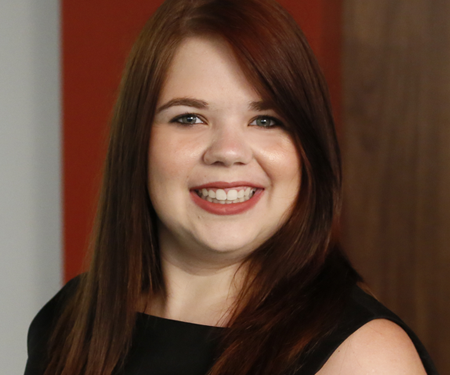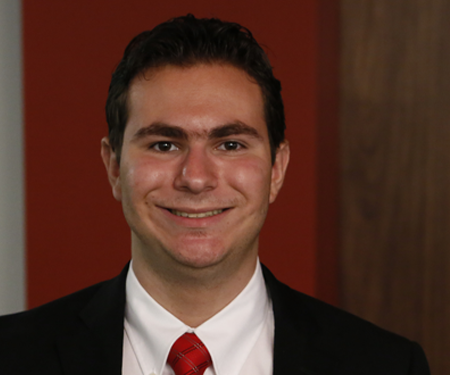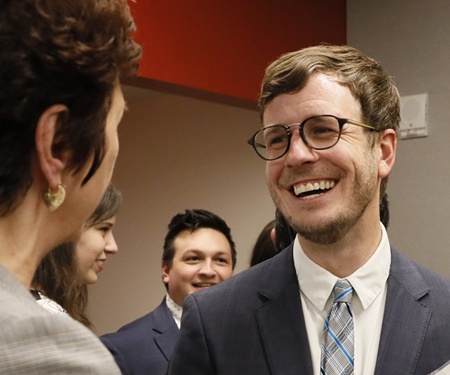Award-winning ASU Law grads offer advice: Get by with a little help from your friends

Greg Fay, Sandra Day O'Connor College of Law
ASU Law convocation update: Arizona’s first female senator and ASU Law alumna, Kyrsten Sinema, will deliver the convocation address for the 2019 graduating class of the Sandra Day O’Connor College of Law during the ceremony on May 8 at Comerica Theatre at 6 p.m. This event requires a ticket for admittance. Public viewing is available through LiveStream.
***
The Sandra Day O’Connor College of Law at Arizona State University attracts some of the brightest minds from throughout the world. It’s a competitive environment, full of straight-A students with the highest credentials.
But it’s also a highly collaborative environment, with students, faculty and members of the surrounding community working together to bring out the best in one another. That’s one of the reasons ASU Law consistently gets outstanding results, ranking among the top schools in the nation for high-quality job placement and bar-passage results.
As the 2019 class prepares to graduate, a common theme emerges when talking to some of the top award-winners: They could not have gotten through the arduous odyssey of law school alone — nor did they have to. Faculty and fellow students are eager to lend support, and once the journey is completed, the lasting friendships and mentorships are every bit as important as the diploma.
“We want students to feel wanted, and that we’re grateful to have them here, because we are,” said ASU Law Dean Douglas Sylvester. “We want to know what our students’ dreams are, and then make sure we help them get there. So when they walk out the door, they’re getting the outcomes they were seeking when they decided to come to ASU Law.”
Three of the top students in the 2019 graduating class are about to walk out that door. Each says ASU Law was the perfect fit, a supportive environment that helped them grow and learn and put them on the path to achieving those dreams.
John S. Armstrong Award: Jessica Kemper

Jessica Kemper, John S. Armstrong Award, Sandra Day O'Connor College of Law
Jessica Kemper is the winner of the John S. Armstrong Award, which honors academic performance and contributions to ASU Law.
A native Arizonan, she was completing her undergraduate degree at ASU, planning to pursue a PhD in biochemistry, when she had a change of heart. As much as she loved science, she did not want to be a scientist, so she began searching for an alternative career path she could pursue with her degree.
“One day, I came across an article written by a chemist-turned-patent-attorney who litigated pharmaceutical patents,” the 24-year-old said. “The thought intrigued me. I remembered that ASU Law had sent me a letter earlier on in the year about one of their programs; it was a miracle I still had it in my glove compartment! I met with Jillian from the admissions team, applied, and had the privilege of being accepted.”
She studied a variety of topics at ASU Law, ranging from intellectual property to water law, and was heavily involved in extracurricular activities, including:
- Was a Center Scholar for the Center for Law, Science & Innovation, and was part of two of their cohorts for all three years of her law school career.
- Served as vice president for the Christian Legal Society chapter at ASU Law.
- Served as president of the Intellectual Property Student Association.
- Was a staff writer and research editor for the Arizona State Law Journal.
She was stunned and humbled to find out she had won the Armstrong Award. She said it “means the world” to her, noting that it is named for John Samuel Armstrong, the legislator who, in 1885, introduced a bill in the territorial legislature to create a school that became ASU.
“ASU will be my only alma mater and has been my home away from home for the past seven years,” she said. “I’m so grateful for everything that ASU has given me as a student and for the opportunities I’ve been able to experience. I could not be more honored to receive an award celebrating the founder of the university that means so much to me.”
She will begin working in the Phoenix office of Snell & Wilmer in September, then, in the fall of 2020, she will clerk for Judge Dominic Lanza at the U.S. District Court for the District of Arizona.
“My experience at ASU Law was fantastic, unparalleled,” she said. “I would not change anything about my experience. Even though pursuing a law degree was one of the most difficult endeavors I have ever undertaken, it has changed my life for the better.”
The Strouse Prize: A.J. Gilman

A.J. Gilman, The Strouse Prize, Sandra Day O'Connor College of Law
A.J. Gilman is the winner of the Strouse Prize, given to the graduate whose academic strengths, contributions to the Center for Law, Science and Innovation, and personal qualities most closely mirror those of beloved faculty member Dan Strouse.
Law school had been in his plans from a very young age, and he went on to fulfill those plans — also at a very young age. A Phoenix native, Gilman enrolled at Paradise Valley Community College when he was just 13 years old, graduating at age 15 with four associate degrees. He then transferred to ASU, graduated with three bachelor’s degrees at age 17, then began taking classes at ASU Law at age 18 — the youngest student in the school’s history.
The astounding academic accomplishments garnered media coverage, including feature articles in USA Today and The Arizona Republic. He said he is always asked whether he felt like he missed out on part of his childhood, or if it was strange to be so much younger than his fellow students. And the answer he always gives, without hesitation: not at all. He said he has had a ton of fun pursuing his college degrees.
“It’s really what you make of it,” he said, about being the youthful outlier in his classes. “If you act normal, people treat you normal.”
It may have helped that Gilman has a close relationship with the second-youngest student in the history of ASU Law — his mother, Susan Gilman.
“I beat her by one year,” he said.
Susan Gilman is now an adjunct faculty member at ASU Law, helping to carry on family traditions. His grandfather is also a lawyer, and his grandmother was a member of ASU Law’s founding class.
Gilman is graduating with a certificate in law, science and technology, with focuses in intellectual property; data, privacy and security; and life sciences. He said he was absolutely honored to find out he had been awarded the Strouse Prize.
“I was honored — it was really amazing,” he said. “I’m not sure the exact reason why they picked me, but I would guess it’s about getting involved.”
Indeed, involvement was a big part of his law school career:
- Was the founding member and president of the ASU Practice Readiness Forum and the Tribune of Delta Theta Phi Law Fraternity.
- Is a member of Desert Blockchain.
- Spoke at the ARMA International Program on Information Governance.
- Participated in the Global Legal Hackathon on a team that won the Phoenix division for their IPFS Encrypted Document Management System.
- Served as an articles editor for the Jurimetrics Law Journal.
- Completed an externship with the Administrative Offices of the Arizona Supreme Court.
He is now looking forward to working for Bacal & Garrison Law Group in Scottsdale, where he will be practicing in the areas of intellectual property and emerging technology law.
And looking back at his academic career, he said he has no regrets.
“If I had a choice to go anywhere, I’d come here all over again — over Harvard, over Stanford,” he said.
Nor does the 20-year-old have any second thoughts about spending his teenage years in college and law school, although there was at least one drawback to being the youngest student at ASU Law.
“You can’t drink,” he said. “And there are a lot of open-bar events.”
The Mary M. Schroeder Public Interest Prize: Greg Fay

Greg Fay, The Mary M. Schroeder Public Interest Prize, Sandra Day O'Connor College of Law
Greg Fay is the winner of the Mary M. Schroeder Public Interest Prize, which is presented to a student who has committed to practice in public interest law upon admission to the bar.
He has done human rights work in China, and after graduation he will be employed as a staff attorney at the Florence Project, providing free legal services to detained migrants in Florence, Arizona, where he also served as the Equality Arizona LGBT Fellow last summer.
But it was a seemingly innocuous job he had in high school, doing far less serious work, that may have set him on his current course.
“I worked in my hometown in Enfield, Connecticut, as a delivery boy for a Chinese restaurant,” the 34-year-old recalls.
Although he was simply delivering food, he bonded with the staff, and that sparked an interest in Chinese culture. After his freshman year of college at Brown University, he went overseas to teach English in China.
“It really changed my life, because I was blown away by Chinese culture,” he said. “And when I got back to Brown, I changed my major to East Asian studies.”
He interned for a group in New York called Human Rights in China. That inspired him to pursue a career in Chinese human rights work, which eventually led him to law school.
“I worked with a lot of attorneys, Chinese lawyers,” he said. “A lot of them had fled China and had political asylum here in the United States. I came to see attorneys as defenders of human rights, and I started developing this idea of how important immigration work is. That’s what motivated me to go to law school — to practice asylum law and to help people who are fleeing human rights abuses and applying for political asylum here in the United States.”
It’s a noble calling, and one that captivated ASU Law’s namesake, retired U.S. Supreme Court Justice Sandra Day O’Connor.
“My favorite moment at ASU Law was during my first year of school,” Fay said. “As part of my scholarship, which is named for Justice O’Connor’s husband, John O’Connor, I was able to attend a Rotary event in his honor. I got to meet Justice O’Connor and sit with her for this event and celebrate her husband’s life, and she absolutely blew me away.”
O’Connor was highly interested in the human rights work he had done in China, engaging in a long one-on-one conversation.
“It was an amazing opportunity to have a conversation with this living historical figure, and she was just incredible,” he said.
Among his many outside activities throughout law school, Fay joined the board of a nonprofit called the Phoenix Legal Action Network, which works to provide free legal services to low-income immigrants in Arizona who are not detained. That aligns with his work with the Florence Project and his passion for helping others, which is why the recognition of the Schroeder Prize is so meaningful.
“ASU has taught me a lot about what doing public interest work looks like here in Arizona,” he said. “I know that Judge Schroeder is an amazing Ninth Circuit judge. One of my classmates is currently her clerk, so I hear incredible things about her, and I’m just very honored to receive this award.”
READ MORE: The future is bright for spring 2019 grads
At ASU Law, opportunities and support abound
Kemper, Gilman and Fay reflect fondly on their time at ASU Law, and all have the same advice for future students: Don’t go it alone.
“My advice for the next class of ASU Law students is to connect,” Kemper said. “It is so easy to become isolated in law school because of the workload involved, and I know that in my experience, connecting with my fellow classmates and others in the legal community sometimes was forced to take a lower priority than classwork. That being said, some of my greatest memories from law school are from connecting with others and forming professional relationships.”
Gilman said one of the most important things a law student can do is make friends.
“It’s all about who you know, not what you know,” he said. “Making friends with professors, going to classes with them, they can help provide amazing opportunities. It’s also important to make friends with other students. They can help you study, and those relationships are really huge.”
Those friendships are what Kemper will remember most fondly.
“Running into friends and colleagues every day in the law school building,” she said, recalling her favorite moments at ASU Law. “For such a large building accommodating so many students, it’s amazing that it can feel like a small community during the school week. Little moments in which I would pass by a friend in the hall and be able to stop and talk to them for five minutes about how their semester was going were such highlights in my days. I’m sure most of the people that I talked to for those few minutes didn’t think something so small would have such a great impact, but it was one of the aspects of law school that I have cherished.”
Fay loved his time in law school, and like Kemper and Gilman, it was the time he spent with friends that he cherishes most — most notably in student organizations, including the Law Society for Human Rights and the LGBT student group Outlaw.
“It was fun to take charge of a group that we, as students, got to come up with the mission and decide what we wanted to accomplish together,” he said. “We worked with each other, the faculty, local attorneys and other interesting figures. The law school gave us a platform to invite speakers, and members of the legal community here are so generous with their time, with their experience and with their knowledge. We were able to get some incredible speakers to come to the law school, and that really enriched our education.”
Kemper said she is thankful for all of the opportunities she’s been given and all of the incredible people she’s met.
“Nobody achieves anything alone,” she said. “My mentors have impacted my life more than they will probably ever know, and I hope for the next class of ASU Law students to be able to form those relationships. And I advise them to, once they are graduated and in their careers, give back and be a part of mentoring and investing in the next generation of law students or young attorneys.”
Gilman says opportunities for engagement outside of the classroom are plentiful.
“The hardest part about law school isn’t the work,” he said. “It’s figuring out what you can do to get involved outside and where you can get those practical experiences. And that’s exciting.”
And Fay points out that ASU Law and the surrounding community provide a generous and supportive network.
“My advice is to seek out mentorship, be it from other law students, from professors, local attorneys, judges — just don’t be afraid to learn from the legal community here. Because that’s how this profession works, and people in Phoenix are really generous with their time.”
More Law, journalism and politics

Native Vote works to ensure the right to vote for Arizona's Native Americans
The Navajo Nation is in a remote area of northeastern Arizona, far away from the hustle of urban life. The 27,400-acre…

New report documents Latinos’ critical roles in AI
According to a new report that traces the important role Latinos are playing in the growth of artificial intelligence technology…

ASU's Carnegie-Knight News21 project examines the state of American democracy
In the latest project of Carnegie-Knight News21, a national reporting initiative and fellowship headquartered at Arizona State…